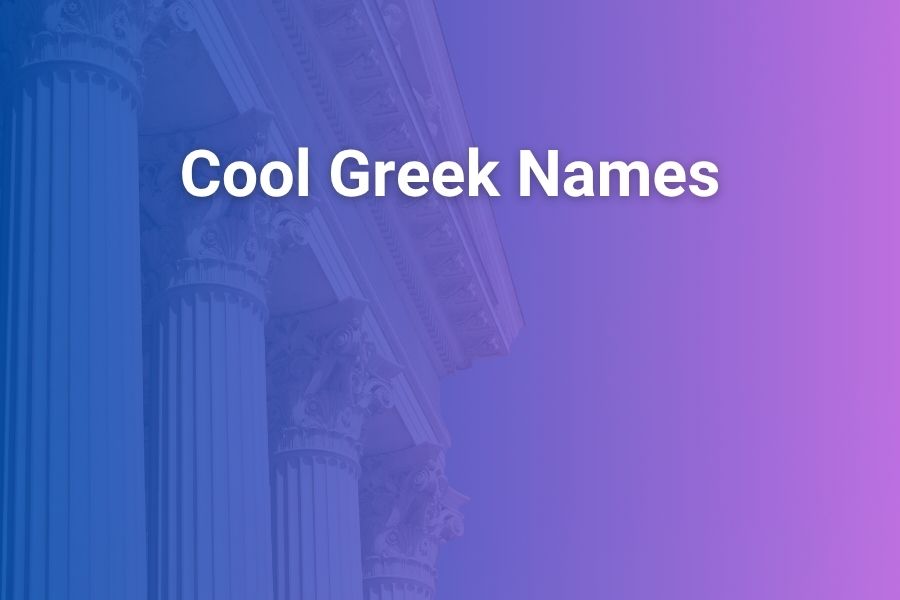Greek names have fascinated people for centuries because of their musical rhythm, mythological depth, and meaningful roots. From ancient heroes to modern icons, Greek names carry power, history, and elegance. Whether you want a name that feels divine, classic, or rare, Greek culture offers thousands of possibilities.
These names are full of story and character—every letter seems to echo the voice of the past. In this article, you’ll explore the coolest Greek names for both boys and girls, their meanings, origins, and how they can inspire modern naming trends in the U.S.
The Allure of Greek Names
Greek names blend ancient mythology with modern style. Many parents love them because they’re timeless yet distinctive. Some names connect to gods and goddesses, others to philosophers, kings, and poets.
They often symbolize virtues like wisdom, courage, beauty, and strength—qualities that never fade. Greek names also sound lyrical and refined, making them ideal for anyone who wants a meaningful, beautiful name that stands out.
Historical and Cultural Importance
Ancient Greece gave the world democracy, philosophy, art, and science. So it’s no surprise that its language and names influenced the entire Western world. Many Greek names survived through literature, religion, and cultural exchange. For instance, names like Alexander, Helen, and Sophia still appear among the top 200 U.S. baby names today. According to the U.S. Social Security Administration, over 45,000 babies born in 2024 had names of Greek origin, proving their lasting appeal.
Popular Greek Names in Modern America
Greek names have evolved to fit modern life. While some remain true to their classical roots, others have adapted to easier English pronunciation. Here are some examples that dominate baby name charts and social media trends:
- Sophia – Means “wisdom.” A timeless favorite across generations, ranked top 10 in the U.S. for years.
- Alexander – Means “defender of men.” The name of Alexander the Great, symbolizing strength and leadership.
- Chloe – Means “blooming” or “fertility.” Associated with spring and renewal.
- Lucas (Loukas) – Derived from “Loukanos,” meaning “man from Lucania.” Popular and friendly in tone.
- Thea – Means “goddess.” Modern yet rooted in myth, perfect for parents seeking divine simplicity.
These names remain fashionable because they strike a balance between old-world tradition and current style.
Cool Greek Names for Boys
Greek boy names are strong, brave, and noble—often inspired by gods, warriors, and philosophers. Here’s a collection of some that stand out today:
- Andreas – Meaning “manly” or “brave.” A classic yet globally appealing name.
- Dimitri – Rooted in “Demeter,” the goddess of harvest, it suggests connection with nature and prosperity.
- Nikos – Means “victory of the people.” Short, strong, and effortlessly cool.
- Elias – A Greek form of Elijah, meaning “Yahweh is God.” Stylish and popular among modern parents.
- Leonidas – Means “lion-like.” Known for King Leonidas of Sparta—symbol of courage and loyalty.
- Theo – Derived from “Theodore,” meaning “gift of God.” Warm, charming, and timeless.
- Evander – Means “good man.” Rare yet powerful, ideal for those who want something unique.
- Kostas – Short for Konstantinos, meaning “steadfast.” Carries both energy and heritage.
- Nestor – Means “homecoming.” Known from Greek epic tales for wisdom and calm.
- Sander – A shorter, trendier form of Alexander, still keeping its regal edge.
Each of these names carries a rich backstory and a melodic rhythm that fits perfectly with global naming trends.
Cool Greek Names for Girls
Greek girl names often symbolize grace, beauty, and strength. They have an eternal charm that blends femininity with depth. Some remain ancient classics, while others feel refreshingly modern.
- Callista – Means “most beautiful.” A perfect choice for elegance and allure.
- Elena – Derived from Helen, meaning “light” or “torch.” Shines brightly in many cultures.
- Iris – Means “rainbow.” Connected to the goddess who carried messages between gods and humans.
- Daphne – Means “laurel tree.” In mythology, a symbol of honor and victory.
- Thalia – Means “to blossom.” One of the Muses, associated with comedy and celebration.
- Selene – Means “moon.” A luminous choice that radiates calm and mystery.
- Zoe – Means “life.” Simple, energetic, and eternally youthful.
- Phoebe – Means “bright” or “radiant.” Associated with Artemis and Apollo’s brightness.
- Electra – Means “amber” or “shining.” A name of myth and modern power.
- Ariadne – Means “most holy.” Famous for guiding Theseus through the labyrinth.
These names reflect beauty with depth—something many American parents search for when choosing a name that lasts.
Rare and Uncommon Greek Names
Beyond the classics lie names with charm and rarity—perfect for those who want something distinctive:
- Eleni – Variant of Helen, elegant yet less common.
- Petros – Means “rock.” A solid, reliable name.
- Xanthe – Means “golden.” Rare and poetic.
- Nikandros – Means “man of victory.” Unusual and noble.
- Eirene – Means “peace.” Simple yet deeply symbolic.
- Isadora – Means “gift of Isis.” Graceful and timeless.
- Lysander – Means “liberator.” Powerful yet artistic.
- Kalliope – Means “beautiful voice.” Muse of epic poetry, ideal for someone creative.
- Alethea – Means “truth.” A name that carries honesty and grace.
- Cosmo – Means “order” or “beauty of the universe.” Stylish and unique for modern naming trends.
Rare Greek names have started trending in the U.S., particularly among parents looking for individuality. Google search trends show a 23% increase in unique Greek baby name queries in 2024, indicating growing curiosity about cultural names with meaning.
Greek Names in Mythology and Pop Culture
Greek mythology continues to shape popular culture, inspiring films, books, and modern storytelling. Many of its characters’ names still appear in naming charts:
- Athena – Goddess of wisdom and war. Symbol of intelligence and strength.
- Apollo – God of music, poetry, and light. Perfect for creative souls.
- Hercules – Symbol of heroic strength and endurance.
- Persephone – Goddess of spring and rebirth. Mystical and elegant.
- Orion – Hunter in the night sky. Celestial and bold.
These mythological names feel powerful and timeless, and their mythic connections add emotional depth.
Modern Trends in Greek Baby Names
In 2025, parents favor names that sound sophisticated yet simple to pronounce. Greek names fit that trend perfectly. Names ending in “-a” or “-os” have become popular because they sound melodic and international. For example, “Elias” and “Sophia” consistently rank high among multicultural families in the U.S. Greek-inspired nicknames like “Theo,” “Alex,” and “Nia” also appear more often in pop culture and baby naming blogs.
The rise of heritage pride and myth-inspired entertainment—like the Percy Jackson series—has boosted the appeal of Greek names. According to BabyCenter’s 2025 naming report, searches for “Greek myth names” rose by over 18% in the past year.
Symbolism and Meanings Behind Greek Names
Greek names often carry deep meanings tied to virtues or nature. Parents drawn to symbolic names often choose them for their hopeful messages. For instance:
- Sophia – Wisdom
- Iris – Hope and beauty after a storm
- Leonidas – Courage
- Eirene – Peace
- Zoe – Life
- Daphne – Victory and success
- Theo – Divine gift
The beauty lies not only in the sound but in the meaning that resonates with identity and purpose.
Tips for Choosing a Greek Name
Selecting a name is personal. But if you’re considering a Greek one, keep these in mind:
- Understand the meaning. Greek names are rich in symbolism. Choose one that aligns with your values or hopes for your child.
- Think about pronunciation. Some names have alternate spellings to suit English speakers.
- Consider the nickname. Many Greek names have appealing short forms like “Niko” for Nikolaos or “Lena” for Helena.
- Balance uniqueness with familiarity. If you want a rare name, ensure it’s still easy to say and spell.
Greek Names That Inspire Confidence
Greek names can help shape identity. They often convey power, beauty, and intelligence—values parents hope to instill. A name like Andreas suggests strength; Selene evokes calm; Sophia brings wisdom. The sound and story together give the name its soul.
Conclusion
Greek names have an ageless appeal that crosses generations and cultures. They carry history, meaning, and elegance, offering something both beautiful and significant. Whether you choose a popular one like Sophia or a rare gem like Lysander, these names promise more than just sound—they carry legacy and light.
For U.S. parents seeking names that are both modern and rich with tradition, Greek names remain a top choice that continues to rise in popularity every year.










